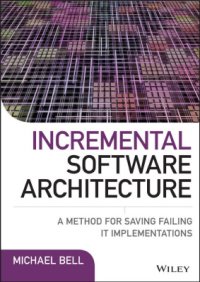
Ebook: Incremental Software Architecture: A Method for Saving Failing IT Implementations
Author: Bell Michael.
- Genre: Computers
- Tags: Библиотека, Компьютерная литература
- Language: English
- pdf
Wiley, 2016. — 391 p. — ISBN-10: 111911764X. — ISBN-13: 978-1119117643The best-practices solution guide for rescuing broken software systems
Devised to rescue failing IT implementations, Incremental Software Architecture presents an advanced approach for designing durable, flawless, and elastic software systems to enable business growth. This is a practical-solutions manual with complete guidance, abundance of hands-on instruction, and powerful remedies formulated to save software malfunction. Such software architecture failure typically hinders organizational response to commerce trends, growing consumer demands, changes to business strategies, and technological evolution.
You'll learn how to avoid developing software systems that are destined to fail and rescue under-performing software implementations that have already deployed to production. These methods and practices will help you circumvent the business losses that cause companies to flounder.
Mitigate risks of software development projects
Accurately assess technological feasibility and viability
Increase return on investments (ROI)
Provide effective tools to assess technological achievability and viability
Introduce software design best practices for enterprise architecture efforts
Identify actual software construction value proposition
Foster software assets reuse and consolidation
Accelerate time-to-market
On the software architecture front, fierce competition and volatile commerce markets drive companies to invest heavily in the construction of software systems, which strains IT and business budgets and puts immense pressure on existing network infrastructure. As technology evolves, these increasingly complex computing landscapes become more expensive and difficult to maintain. Incremental Software Architecture shows you how to revamp the architecture to effectively reduce production environment burden, cost, and the chance of failure.
Devised to rescue failing IT implementations, Incremental Software Architecture presents an advanced approach for designing durable, flawless, and elastic software systems to enable business growth. This is a practical-solutions manual with complete guidance, abundance of hands-on instruction, and powerful remedies formulated to save software malfunction. Such software architecture failure typically hinders organizational response to commerce trends, growing consumer demands, changes to business strategies, and technological evolution.
You'll learn how to avoid developing software systems that are destined to fail and rescue under-performing software implementations that have already deployed to production. These methods and practices will help you circumvent the business losses that cause companies to flounder.
Mitigate risks of software development projects
Accurately assess technological feasibility and viability
Increase return on investments (ROI)
Provide effective tools to assess technological achievability and viability
Introduce software design best practices for enterprise architecture efforts
Identify actual software construction value proposition
Foster software assets reuse and consolidation
Accelerate time-to-market
On the software architecture front, fierce competition and volatile commerce markets drive companies to invest heavily in the construction of software systems, which strains IT and business budgets and puts immense pressure on existing network infrastructure. As technology evolves, these increasingly complex computing landscapes become more expensive and difficult to maintain. Incremental Software Architecture shows you how to revamp the architecture to effectively reduce production environment burden, cost, and the chance of failure.
Download the book Incremental Software Architecture: A Method for Saving Failing IT Implementations for free or read online
Continue reading on any device:

Last viewed books
Related books
{related-news}
Comments (0)